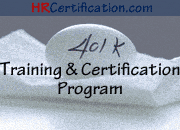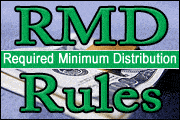Training For Retirement Plan Administration
What Is An Employer-Sponsored Retirement Plan?
An employer-sponsored retirement plan, such as a 401(k) or a Defined Benefit Plan, is a retirement savings plan that is offered by an employer to its employees as part of their benefits package.
These plans are designed to help employees save and invest for retirement in a tax-advantaged manner, but but include a number of requirements to make and keep the plan "legal".
What Does A Retirement Plan Administrator Do?
Retirement Plan Administrators are fiduciaries with multiple things that they are responsible for, including making sure that the plan adheres to government rules and regulations for the plan documents, investment options, testing, and reporting.
What Are The Basic Requirements For Administering A Retirement Plan?
Administering a retirement plan involves several key requirements to ensure compliance with regulations and the smooth functioning of the plan. Here are some of the basic requirements that you can learn about - or avoid making mistakes on - by taking one of our training courses for retirement plan administrators:

- Plan Document:
Every retirement plan must have a written plan document that outlines the terms and conditions of the plan. This document must comply with the relevant laws and regulations governing retirement plans, such as the Employee Retirement Income Security Act (ERISA) in the United States. - Fiduciary Responsibility:
Plan administrators have a fiduciary duty to act in the best interests of the plan participants and beneficiaries. This includes prudently managing the plan assets, selecting and monitoring investment options, and ensuring that fees are reasonable. - Participant Communication:
Administrators are responsible for providing plan participants with information about the plan, including details about eligibility, contribution limits, investment options, and distribution options. This information must be provided in a clear and understandable manner. - Recordkeeping:
Accurate recordkeeping is essential for administering a retirement plan. This includes maintaining records of participant contributions, investment transactions, account balances, and distributions. - Compliance Testing:
Retirement plans must undergo various compliance tests to ensure that they meet the requirements of the Internal Revenue Code (IRC) and other applicable regulations. This may include tests related to nondiscrimination, contribution limits, and coverage. - Reporting And Disclosure:
Plan administrators are required to file certain reports with government agencies, such as the Department of Labor (DOL) and the Internal Revenue Service (IRS). They must also provide certain disclosures to plan participants, such as summary plan descriptions and annual reports. - Investment Management:
Administrators are responsible for selecting and monitoring the plan's investment options. They must prudently select investment options that are suitable for the participants and periodically review the performance and fees associated with these options. - Compliance With Laws And Regulations:
Retirement plans must comply with various laws and regulations, including ERISA, the IRC, and any applicable state laws. Administrators must stay up-to-date on changes to these laws and ensure that the plan remains in compliance. - Plan Governance:
Retirement plans typically have a governing body, such as a board of trustees or a plan committee, responsible for overseeing plan administration. This governing body is responsible for making decisions related to the plan and ensuring that it is operated in accordance with the plan document and applicable laws. - Plan Documentation and Record Retention:
Administrators must maintain accurate records of plan documents, participant data, and administrative actions. They must also retain these records for a specified period of time, as required by law.
Recommended Retirement Plan Administration And Compliance Training Courses
HR Training Center offers Retirement Plan and 401k training courses, as well as Retirement plan certification courses such as the prestigious "Certified 401k Administrator" designation. Regardless of whether you handle the retirement plan administration for your company, or are a Third Party Administrator (TPA) seeking training for your staff, we can help!
Listed below are some of our most-popular retirement plan compliance training courses. Either select on of these recommended courses or select "Retirement Plan Training" from the "Professional Development" section of the search box below.
401k Training & Certification Program
Our 401k Plan Training & Certification Program is loaded with information on plan design, administrative options, and compliance requirements to help you understand the many and complex 401k rules.
More than just a read-along format typical in printed books, the course includes numerous examples, "Administrative Tips", and "Procedural Recommendations", as well as scenario-based, multiple choice interactive quizzes (with answer rationale provided) that test your ability to apply the correct procedures and processes learned during training that are key to 401K administration.
This course covers:- Eligibility & Coverage Requirements

- Plan Design & Documentation
- Plan Investments
- Communication & Enrollment
- Vesting
- Administration
- Compliance With The Nondiscrimination Rules
- Top-Heavy 401k Plans
- 401k Distribution Rules
- Taxation
- Plan Expenses
- Reporting Requirements
- Fiduciary Responsibility
- Amendments
- Terminations
- Plan Mergers
More Details/Order: https://hrtrainingcenter.com/401-k-training-certification-program/online-training
Defined Benefit Plan Training & Certification Program
This course covers:
- Introduction To Defined Benefit Retirement Plans
- Eligibility And Coverage
- Benefits In A Defined Benefit Plan
- Plan Design & Documentation
- Plan Investments
- Communication And Enrollment
- Vesting
- Administration
- Top-Heavy Defined Benefit Plans
- Distributions
- Taxation & Rollover Of Distributions
- Reporting Requirements
- Role Of The Actuary
- Fiduciary Responsibility
- The Role Of The PBGC
More Details/Order: https://hrtrainingcenter.com/defined-benefit-training-and-certification-program-ot1000020
Cash Balance Plans Training & Certification Program
By taking this course, you will be able to:- Understand what a Cash Balance Plan is
- Correctly manage a Cash Balance Plan
- Properly handle all documentation and compliance requirements
More Details/Order: https://hrtrainingcenter.com/cash-balance-plans-training-and-certification-program-ot1000041
Plan Loans Training & Certification Program
This course provides an overview of the rules that apply to participant loans under qualified plans (including 403(b) plans).
Upon completion of this course, you will be able to:- Identify the purposes for which a participant loan may be made
- Determine the maximum loan amount
- Describe how to apply loan repayments
- Identify the requirements that must be satisfied in order for a participant loan to avoid being a prohibited transaction
- Identify the requirements that must be satisfied in order for a participant loan to avoid being treated as a taxable distribution
- Describe the deemed distribution rules
- Describe various participant loan issues and how to correct them
More Details/Order: https://hrtrainingcenter.com/plan-loans-training-and-certification-program-ot1003394
Spousal Rights & Consent Requirements Training & Certification Program
This course provides an overview of the spousal consent requirements as they apply to qualified plans (including 403(b) plans). Upon completion of this course, you will be able to:
- Describe the origins of the spousal consent requirements
- Define the word "spouse"
- Describe the spousal consent requirements under a plan subject to the qualified joint and survivor annuity requirements
- List the exceptions to the spousal consent requirements under plans subject to the qualified joint and survivor annuity requirements
- Describe the spousal consent requirements applicable to qualified pre-retirement survivor annuities
- Describe a spouse's rights regarding the form and timing of payment under a plan subject to the qualified joint and survivor annuity requirements
- Identify the requirements necessary for a plan to avoid being subject to the qualified joint and survivor annuity requirements
- Describe the spousal consent requirements under plans that are exempt from the qualified joint and survivor annuity requirements
- Identify the steps that must be taken to correct spousal consent failures
- Describe the effects that qualified domestic relations orders and so-called "slayer statutes" have on the spousal consent requirements
More Details/Order: https://hrtrainingcenter.com/spousal-rights-and-consent-requirements-training-and-certification-program-ot1003392
Required Minimum Distributions Training & Certification Program
This course provides an overview of the Required Minimum Distribution (RMD) rules under IRC section 401(a)(9), as they apply to defined benefit plans.
Upon completion of this course, you will be able to determine:- The Required Beginning Date (RBD) for defined benefit plans

- How to calculate first year payments for Lifetime RMDs
- How to calculate death RMDs
- Who, if anyone, is a "designated beneficiary" for purposes of death benefits
- How benefits must be paid if a participant dies before RMDs begin
- How benefits must be paid if a participant dies after RMDs begin
- Whether an annuity payment satisfies the RMD rules
- Whether a "period certain" under an annuity satisfies the RMD rules
- When Defined Benefit plan distributions are eligible rollover distributions
- What portion of a lump sum distribution should be treated as an eligible rollover distribution
- When an actuarial increase to a participant's benefits is required because of the participant's retirement date
- When benefit payments must be adjusted because of additional accruals or vesting that occurs after distributions begin
- How the RMD rules apply when a Qualified Domestic Relations Order applies to a participant's benefits
More Details/Order: https://hrtrainingcenter.com/required-minimum-distributions-training-and-certification-program-ot1003372
Find Seminars, Webinars, And Online Training In Your Area
About Retirement Plan Training And Administration
Includes Updates For The SECURE Act And 2024 Rule Changes
Searching for 401k plan or retirement plan training to meet your retirement plan compliance and administrative requirements? A Retirement Plan Certification?
Looking for help with retirement plan administration, updates to retirement plan rules, or retirement plan changes? Need 401k plan training, defined contribution training, or defined benefit plan training? Then you've come to the right place!
Are Retirement Plans Required By Law?
The law does not require an employer to establish a retirement plan. It only requires that those who establish a retirement plan meet certain standards.
What Makes A Retirement Plan Qualified?
To be a "Qualified" Retirement Plan, the plan must meet certain provisions as set forth by the government. For instance, it should benefit all employees, not just management (hence the Discrimination Testing requirements), have pre-determined and written vesting and distribution options, and comply with specific reporting requirements.


 770-410-1219
770-410-1219












